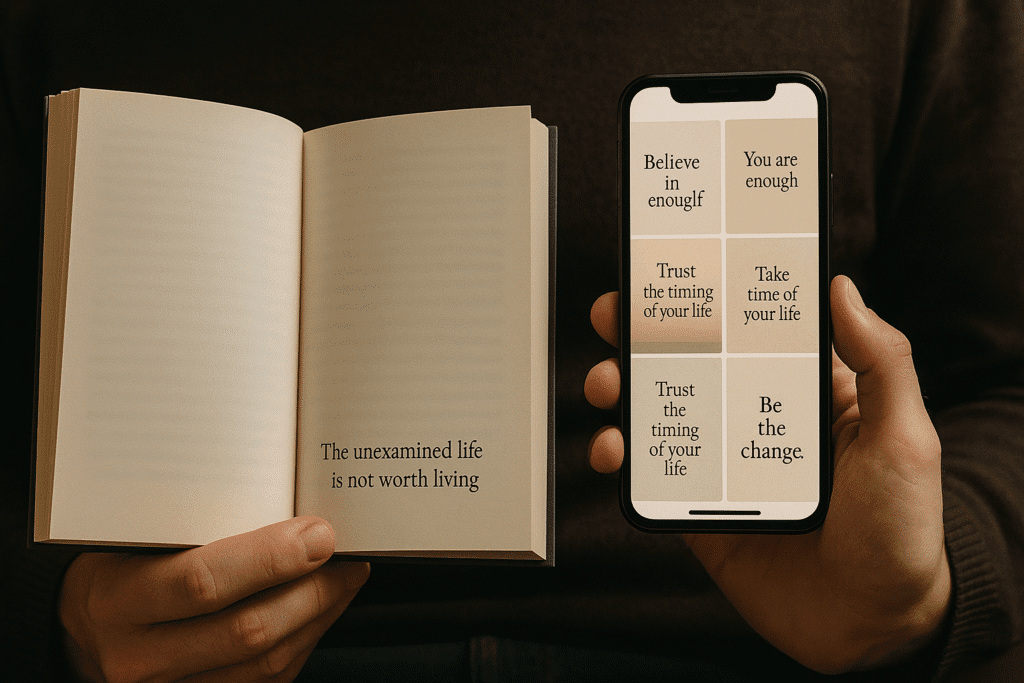Introduction

In the age of social media, everyone seems to be a philosopher. Scroll through Instagram or Twitter, and you’ll find endless “deep” quotes shared by influencers, self-proclaimed gurus, and the everyday person. But here’s the question: How many of these quotes actually carry substance? Are they offering real wisdom, or have they simply been repurposed into catchy phrases to look good on a curated feed?
We’ve all seen them – the beautifully designed quote cards that promise profound insights about life, love, and success. The problem? Most of them are nothing more than a façade. What seems like wisdom is often just a shallow attempt to sound insightful, while the true depth of philosophical ideas gets lost in the noise.
In this post, we’re going to explore the concept of “fake deep,” examine how social media has transformed ancient wisdom into aesthetic quotes, and discuss why you should be cautious before buying into these quick fixes for meaning.
The Rise of “Fake Deep” Quotes

In the last decade, social media platforms like Instagram, Twitter, and Pinterest have become the new temples of self-expression. And with that, a new breed of “wisdom” has emerged—one that’s not based on deep understanding, but on surface-level aesthetics and catchphrases designed to provoke quick engagement. It’s easy to scroll through your feed and see an attractive image paired with a quote that feels profound, but what’s often missing is the context or the real-world application that would give it substance.
Social media has made wisdom accessible to everyone, but in doing so, it has also diluted its true meaning. A quote that once took years, even centuries, to develop and communicate is now condensed into a 140-character tweet or a stylish Instagram post. It’s all about the aesthetic—the colors, the fonts, and the image that draws people in. But the actual depth of thought behind these quotes? That often gets lost in the quest for likes, shares, and comments.
So, how did this happen? Well, social media culture has shifted the way we value information. We want instant gratification. We want quick, digestible content that fits into our fast-paced lives. And that’s exactly what these fake deep quotes offer—short bursts of “wisdom” that make us feel good, but rarely push us toward meaningful change or self-improvement.
The Power of Aesthetic Over Substance
What makes a “fake deep” quote so appealing? It’s the power of aesthetics. People are drawn to visuals, and social media has optimized this attraction. A well-designed quote with a beautiful background will likely generate more likes and shares than one that lacks visual appeal. In the realm of “fake deep,” the message takes a back seat to the image it’s paired with.
Take a moment to think about it: Have you ever come across a quote that seems to strike a chord, only to later realize it was entirely meaningless or even contradictory when examined more closely? Perhaps it was something like “Everything happens for a reason,” or “What you think, you become.” While these statements may sound profound, they rarely provide practical insights or deeper understanding. In reality, they are vague and often fail to address the complexities of life.
Why do these types of quotes succeed in grabbing attention? It’s simple: they play on our emotions and our desire for clarity. In a world filled with overwhelming information, people crave simplicity. “Fake deep” quotes promise just that—quick answers that are easy to understand, even if they don’t offer any real solutions.
This is not to say that aesthetics don’t have their place in communication—after all, presentation is key. But when aesthetics begin to overshadow the actual meaning of a quote, it diminishes the value of the wisdom being shared. Social media has turned profound thoughts into palatable soundbites, making it easier for anyone to feel like an expert without truly engaging with or understanding the concepts they present.
The Decline of Meaningful Conversations
In today’s digital age, deep discussions have become harder to come by. Social media has created a world where everything is boiled down to easily digestible soundbites, leaving no room for nuance or real conversation. The rise of “fake deep” quotes is a perfect example of how this shift has affected how we communicate and engage with complex ideas.
Conversations that once revolved around intellectual debates, philosophical inquiries, or deep personal reflections are now being replaced with short, catchy quotes. The problem lies in how these soundbites make us feel like we’re engaging in deep conversations, without actually engaging in them. It’s an illusion of depth, often created through aesthetics or simple, catchy phrasing, with little to no substance behind them.
This trend also reflects our culture’s growing aversion to complexity and discomfort. Many people prefer to skim the surface rather than dive deep. When everything is made easy to understand or delivered in a short sentence, it becomes harder to truly connect with others on a meaningful level.
“Fake deep” quotes, then, not only serve to mislead us into thinking we understand something complex, but they also encourage us to avoid the harder, more uncomfortable conversations about life, truth, and purpose. This decline in meaningful discourse has left many craving real wisdom, yet unable or unwilling to engage with it when it appears.
The Hidden Dangers of Fake Deep Quotes

While fake deep quotes may seem harmless, they come with subtle dangers. They propagate a sense of superficial wisdom that can give us a false sense of intellectual accomplishment without ever challenging us to grow or think critically. These aesthetically pleasing phrases often serve as a shortcut to deep thinking, providing an illusion of insight without the effort required to develop true understanding.
First, let’s acknowledge how these quotes play into the desire for instant gratification. Social media platforms are designed to keep us hooked, and fake deep quotes thrive in this environment because they’re easy to digest and share. They offer a quick hit of feel-good wisdom, but they rarely lead to any meaningful change in the way we approach life or our personal growth. Instead of taking time to learn or engage in introspective thought, we scroll through these curated images of wisdom and feel satisfied, without ever asking ourselves: “What does this really mean for me?”
This constant cycle of instant, shallow wisdom can create a dangerous pattern where we believe we’ve already done the work, simply because we’ve encountered the right quote. Over time, this reduces our capacity for deep, critical thinking, and it leads to a form of intellectual laziness. We begin to believe that collecting these quotes is equivalent to gaining wisdom, without putting in the effort to understand the complex issues behind them.
Additionally, these superficial ideas may dilute the true wisdom of the original thinkers and philosophies. When a powerful quote from a philosopher, spiritual leader, or thought-provoking author gets reduced to a catchy slogan, it loses the richness and context that originally made it meaningful. As a result, we miss out on the depth of insight that comes from exploring those ideas more fully.
By opting for the quick fix of a fake deep quote instead of exploring the genuine complexities of life, we rob ourselves of the opportunity to develop real wisdom. This is where the true danger lies—fake deep quotes don’t just fail to provide meaningful insight; they can actively stunt our intellectual growth by reinforcing surface-level thinking.
The Real Path to Wisdom and Growth
If fake deep quotes are merely a shallow imitation of wisdom, then what does real wisdom look like? True wisdom, the kind that leads to lasting personal growth and understanding, requires much more than a quick read of an inspirational phrase. It demands introspection, self-discipline, and an honest look at the complexities of life. Real wisdom comes from consistent learning, genuine curiosity, and the courage to challenge our beliefs and assumptions.
One of the most powerful ways to gain true wisdom is through reflection. In a world dominated by constant distractions and noise, finding the space and time to reflect is becoming increasingly rare. Yet, it’s in these quiet moments that we can process our experiences, learn from our mistakes, and come to understand ourselves on a deeper level. This is where true growth begins—by asking ourselves tough questions, critically examining our lives, and taking responsibility for our actions and choices.
In addition to reflection, real wisdom comes from reading and engaging with authentic sources of knowledge. Whether it’s the works of great philosophers, the teachings of spiritual leaders, or modern-day thought leaders who challenge the status quo, diving into these texts offers a richer, more nuanced understanding of life. By reading and reflecting on the works of those who have spent their lives contemplating the human experience, we begin to see the complexities and contradictions of life that fake deep quotes completely gloss over.
Moreover, cultivating wisdom requires action. It’s not enough to simply read and reflect on these ideas—we must put them into practice. This means adopting new habits, facing our fears, and embracing challenges that push us outside our comfort zones. True wisdom doesn’t just sit in the intellect; it is something that is lived, experienced, and expressed through our actions.
Finally, embracing humility and recognizing that we do not have all the answers is key to true wisdom. The more we learn, the more we realize how much we still have to learn. This openness to continual growth, and the willingness to admit that we don’t know everything, is one of the hallmarks of a wise individual. Instead of relying on catchy phrases or hollow wisdom, we seek to engage with the world in a meaningful and thoughtful way.
So, how do we move forward from the world of fake deep quotes? We do so by committing to lifelong learning, cultivating self-awareness, and embracing the complexities of life with humility and openness.
How to Distinguish Real Wisdom from Fake Deep Quotes

In today’s digital age, we’re inundated with an endless stream of quotes, soundbites, and memes that promise to provide all the wisdom we need for life. Yet, how can we discern the true gems of wisdom from the fleeting, catchy phrases that often lack substance? It’s not always easy, but it’s essential if we want to avoid falling into the trap of superficial thinking.
One way to distinguish real wisdom from fake deep quotes is to examine the depth of the message. Does the quote offer a broad, meaningful insight into life or human nature? Or does it merely sound profound without offering any real substance? True wisdom is timeless, rooted in deep thinking and reflection. It’s not just about sounding good in a moment; it’s about providing value that can withstand the test of time.
For example, consider the difference between a quote like, “Don’t let fear control you,” which sounds motivating on the surface, and a deeper message like, “Fear is not the enemy; it’s our response to fear that shapes us.” The latter offers a deeper understanding of how to deal with fear, rather than simply suggesting that we should avoid it. It encourages us to think about our own relationship with fear and how we can transform it into a tool for growth.
Another way to spot fake deep quotes is to look at their origin. Does the quote come from a credible source, someone with experience or expertise in the field? Real wisdom often comes from people who have spent years learning, studying, and reflecting on life. It’s the result of lived experiences and thoughtful contemplation, not just catchy phrases that sound good in a moment.
Moreover, real wisdom doesn’t just offer easy answers—it invites us to engage with difficult questions. It challenges us to think critically and examine our assumptions. Fake deep quotes, on the other hand, tend to provide oversimplified answers that don’t require much thought. They appeal to our desire for quick fixes rather than encouraging us to wrestle with the complexities of life.
Lastly, genuine wisdom encourages us to take action. It’s not about waiting for the perfect moment or relying on external motivation—it’s about making conscious decisions that align with our values and goals. Real wisdom invites us to step into the unknown, face our fears, and create positive change in our lives. Fake deep quotes, by contrast, often create a sense of passivity, where we are encouraged to simply “be” without actively working towards meaningful transformation.
In summary, distinguishing real wisdom from fake deep quotes requires us to dig deeper and reflect on the message behind the words. We need to ask ourselves whether the quote challenges us to think critically, if it comes from a credible source, and whether it inspires us to take meaningful action.
The Dangers of Following Fake Deep Wisdom
The prevalence of fake deep quotes and superficial wisdom poses a significant danger to our personal development and mental well-being. When we begin to adopt these quotes as our guiding principles, we risk building our worldview on shaky foundations. Instead of fostering critical thinking and resilience, we may start to believe that success, happiness, and fulfillment are easily achieved by simply reciting a few catchy phrases.
One of the biggest dangers of fake deep wisdom is that it can lead to unrealistic expectations. For instance, a quote like “The only limit is your mind” may sound empowering, but it oversimplifies the complexities of life. Yes, mindset is important, but it doesn’t account for external factors such as societal pressures, financial limitations, or unforeseen challenges. When we base our decisions on these kinds of oversimplified ideas, we may set ourselves up for frustration and disappointment when things don’t go as planned.
Another danger of fake deep quotes is that they can create a false sense of accomplishment. It’s easy to feel like we’re making progress in life when we post a motivational quote on our social media or reflect on a deep-sounding phrase. However, without meaningful action or true understanding, this kind of “wisdom” does nothing to actually move us forward. It’s a form of intellectual comfort, where we feel enlightened but never truly take steps to improve our lives.
Furthermore, relying on fake deep wisdom can prevent us from facing the hard truths about ourselves and our circumstances. Genuine wisdom encourages us to confront our weaknesses, mistakes, and limitations head-on. It pushes us to grow and evolve, even when it’s uncomfortable. In contrast, fake deep quotes tend to avoid the difficult conversations, focusing instead on simple, feel-good messages that don’t challenge us to improve or change. This can lead to stagnation, where we never develop the tools or mindset necessary to overcome real obstacles in our lives.
Lastly, fake deep wisdom can foster a sense of isolation. As we consume more superficial content, we may start to feel like we’re the only ones who don’t have it all figured out. When everyone around us is quoting catchy phrases and seemingly living perfect lives, we may feel inadequate or even like a failure. The reality is, most people struggle with the same issues, but social media and fake deep quotes mask the challenges and hardships we all face. Genuine wisdom, however, fosters a sense of connection and shared experience, reminding us that we’re all in this together.
In conclusion, while fake deep quotes may provide temporary comfort or motivation, they ultimately undermine our growth and development. They offer quick fixes without substance, leaving us stuck in a cycle of superficial thinking. To truly evolve and live a meaningful life, we must seek out wisdom that challenges us, forces us to confront the truth, and encourages us to take action. Only then can we break free from the empty promises of fake deep wisdom and begin to live with purpose and clarity.
Conclusion: Breaking Free from Fake Deep Wisdom
In the age of social media and viral quotes, it’s easy to get swept up in the allure of fake deep wisdom. These quotes, while catchy and often emotionally stirring, do little to help us navigate the complexities of life. In fact, they can often mislead us into believing that success, happiness, and fulfillment can be attained simply by repeating a few inspirational phrases.
True wisdom, on the other hand, is grounded in reality. It requires hard work, self-reflection, and the willingness to face discomfort. It’s not about avoiding challenges or pretending to have all the answers. It’s about being honest with ourselves, learning from our failures, and continually striving to improve.
If we want to live meaningful and fulfilling lives, we must break free from the trap of fake deep quotes. Instead of seeking easy answers, we need to embrace the difficult work of self-growth. This means taking responsibility for our actions, questioning the narratives we’ve been told, and actively seeking out knowledge that is both practical and transformative.
So, the next time you come across a quote that feels like it’s too good to be true, take a moment to reflect. Does it offer real insight, or is it simply another distraction from the real work of living authentically? Remember, true wisdom doesn’t come from a catchy phrase – it comes from lived experience, hard-earned lessons, and the courage to face life’s challenges head-on.
Call to Action:
If you’re ready to break free from the surface-level wisdom and dive deeper into true personal growth, check out some of the books below. These reads will challenge your thinking, inspire genuine change, and help you develop a mindset that goes beyond superficial quotes.
- The Subtle Art of Not Giving a Fck* by Mark Manson
- Atomic Habits by James Clear
- Man’s Search for Meaning by Viktor Frankl
- The Power of Now by Eckhart Tolle
- Grit by Angela Duckworth
FAQ’s
What is “fake deep” wisdom?
“Fake deep” refers to superficial or overly simplistic phrases that appear to offer profound insight but lack real substance. These quotes or ideas often get shared widely on social media because they resonate emotionally, but they don’t provide any actionable or meaningful guidance for personal growth.
How can I differentiate between real wisdom and fake deep quotes?
Real wisdom typically requires a deeper understanding of life and involves practical insights that can be applied. It’s grounded in experience, reflection, and personal growth. Fake deep quotes, on the other hand, are often vague, overly generalized, and lack real substance. A good test is to ask: Does the quote offer a concrete lesson or just a feel-good sentiment?
Are fake deep quotes harmful?
While fake deep quotes may not cause direct harm, they can contribute to the culture of instant gratification and surface-level thinking. They might make us feel good in the moment, but they don’t challenge us to think critically, work through our struggles, or pursue long-term personal development.
Why do people like fake deep wisdom?
People are drawn to fake deep quotes because they provide instant gratification. They’re easy to understand and often speak to our emotions. In a fast-paced, information-heavy world, these quick hits of wisdom feel comforting and reassuring, even though they don’t lead to real change.
Can real wisdom be found in social media?
Yes, real wisdom can be found in social media, but it requires discernment. Not all quotes or content on social media are fake deep. Some accounts, authors, and thought leaders share valuable insights that can truly help us grow. The key is to approach what we consume with a critical mindset and seek out content that challenges us to think deeply and take meaningful action.
